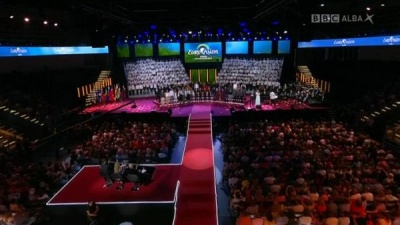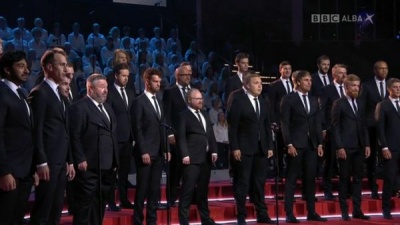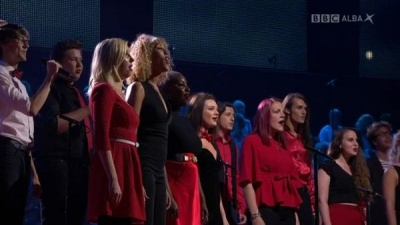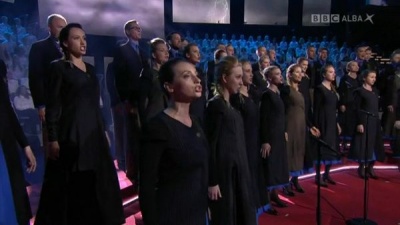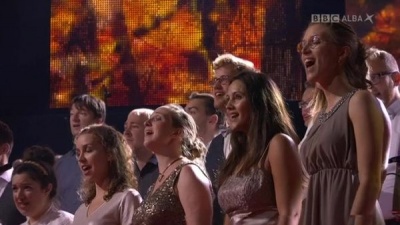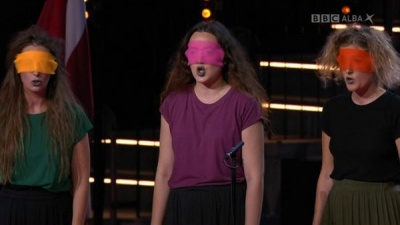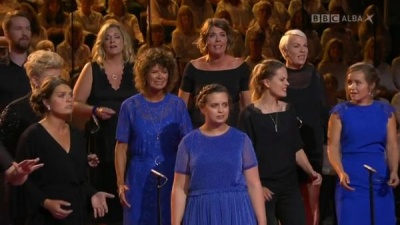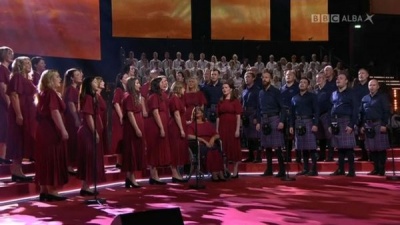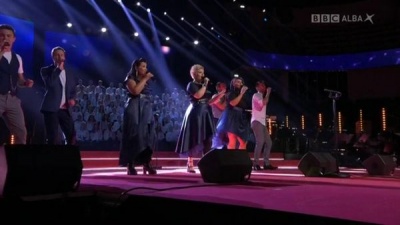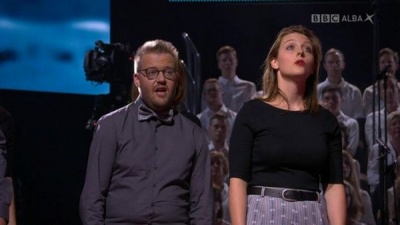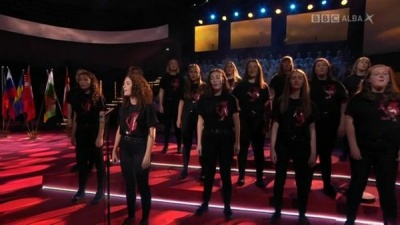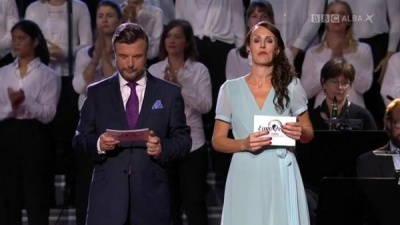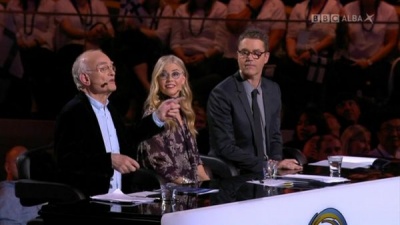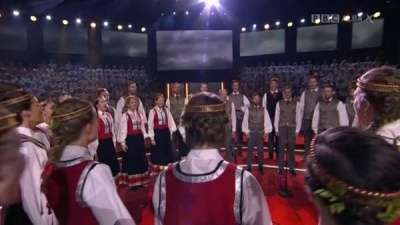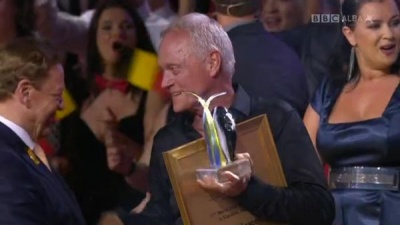Weaver's Week 2019-08-11
Last week | Weaver's Week Index | Next week
Anyone for a good old sing-song?
Eurovision Choirs
SVT for EBU, 3 August
Ella Petersson and Petroc Trelawney host from the Patilla Arena. It's a smart concert, hosts and judges are in formal evening wear, choirs look smart. Most of the choirs will sing folk tunes from their homelands; the "from their homelands" part is in the rules. The opening act is a mass singalong from one of the local choirs, of work from local favourites ABBA.
"Singing is a pastime that brings people together across Europe," says Petroc. Eurovision Choir kicks off the European Choir Games, and the winning choir gets an all-expenses paid trip to Antwerp for next year's World Choir Games. The voting format is 100-0, all the results are decided by the jury of John Rutter, Katarina Henryson, and Deke Sharon. Their criteria are technical skill, quality of sound, musicianship and expression, human warmth and communication. Repertoire will be considered in a close decision.
Viewers at home get no say in the result. Not very democratic, but it does mean the interval act will be more interesting than the S4C voting disclaimer read in Welsh and English.
Zero8 start us off, representing SVT (Sweden). They're a group of about 50 men in sharp black suits. Their piece is very fast, starts of sounding like a chiming clock, then turns into a train sprinting down the tracks. A second piece shows their close vocal harmonies, groups look like they'll be at each other's throats if they're not damned careful. Lads, it's not dark yet, too early for a punch up.
Almakalia represent RTBF (Belgium), and their conductor Nicolas Dorian has been here before, representing RTBF in the Eurovision Song Contest of 2011. The group is mixed voices, about 20 young people. They change tempos, swap from the lads leading to the ladies, and there's some very impressive human beatboxing here. Eight modern pop songs melded in just four minutes, the judges will pick three choirs to sing again in the superfinal. The bar has been set, that was impressive.
Babite Mixed Choir MASKA perform for LRT (Latvia). As is traditional on Eurovision contests, the performers are introduced by a postcard, in this case filmed in a forest near their home. There are about 30 in this choir, all dressed in black. They kick off with some frightening noise, it sounds like they're angry and will call down thunder, lightning, and they'll bang that gong they've got stage left. Rain is made by banging on their knees. That went down very well in the hall.
BonnVoice are the representatives of WDR (Germany). "Yn côr jazz-pop" says S4C's commentator: we know more Welsh than we thought. Another large choir of about 30, in silvers and white, and somewhat older than we've seen. They start with a harmonic section, all singing to the same tune, before splitting into parts for percussion and lead vocals. "dum de dum de dum," go half the choir as the others sing about the maiden of the Rhur, or some such. Pleasant, but not as dramatic as the last entry.
Volve Vokal represent NRK (Norway), the first women's choir on the show. At the start of the performance, all 20 women stand in a long line, wearing a brightly-coloured top, with a contrasting gauze covering her eyes. And clashing lipstick, too. Only in the closing moments do the women remove their masks, and all sing-talk in one voice. It's a very arty performance, this column only got a nebulous *something* is happening, but we enjoyed it.
While S4C took an advert break, BBC Alba showed a piece about the short history of Eurovision Choirs, narrated by Eurovision deity Jon Ola Sand.
Vocal Line begin the second half, they represent DR (Denmark). About two dozen in this choir, mostly women so they're singing with less bass than some others. Some of the choir are using hand microphones, ensuring that they'll be amplified in the mix. Some very crisp diction, and the more trebley arrangement allows an optimistic piece to soar. This could be going places.
And if you're watching BBC Alba, your commentator is about to explode. Alba (the choir) appear for BBC Alba (shown as "Scotland" on screen, not Alba). Joy Dunlop is the conductor, and the 35-strong mixed voice choir has been created for tonight's event. The women are wearing long red dresses, the blokes have dark shirts and tartan kilts and sporrans.
They're singing a medley in Gaelic, it's a slow and contemplative number until halfway through, when the choir starts stomping in their places. So much stomp that the camera shakes a time or two. To be brutally honest, this isn't going through to the final three: we've just seen two much better performances, where it sounded like the choir had as many voices as members. Alba rarely got beyond "men sing this, women sing that".
Before the contest, BBC Alba showed their preparations for their very first Eurovision contest. Joy took a trip to see the Senior Eurovision Song Contest in Tel Aviv, where she spent time with Keiino. You remember, "Spirit in the sky", the one with Sami throat-singing. That's what Joy and BBC Alba wanted to research, how to portray an unusual ethnic tradition in a sensitive and authentic manner. They won't win the contest – perhaps the choir needed more time together – but they've represented Gaelic Scotland to the world, and that justifies BBC Alba taking part.
Just seven members comprise Jazzva, representing RTVSLO (Slovenia), the defending champions of this contest. A pop-jazz combo, they doo-wop and step across the stage, reconfiguring the group's shape as they go. From a crescent to a straight line, moving who's in the centre. They do fast tempo, they do slow tempo, mostly jazz-like of parts and harmonies. With so few voices, there's no room for error, handmikes mean we will hear any bum notes – and there are none to hear. And this is what really brings out Alba's lack of parts – all seven members here bring their own unique contribution.
Got a cake to bake? Cake O'phonie were formed for a television choir competition, and won the ticket from RTS (Switzerland). Fourteen in the choir, men in grey shirts and bow-ties, women in black tops and patterned skirts. Their performance is of traditional music en français, im deutsche, and im romansch. And then in Italiano, a joyful segment where some of the choir start dancing – we haven't seen proper dance from anyone else. Could have heard more of that.
And if you're watching S4C, your commentator is about to cheer for the home team. Ysgol Gerdd Ceredigion won the Côr Cymru contest earlier in the year, and take their place on the stage. Islwyn Evans is the conductor, he also conducted for S4C (on screen as "Wales") in the last contest.
There's about 40 girls on stage, wearing black t-shirts emblazoned with a dragon. The routine starts with "Coula", a frantic song to show off their sharp diction and multi-part harmonies. At times, they're almost singing a round, like "London bridge is falling down" but much more complex. "Ar lan y môr" is their second piece, a more traditional and much slower ballad. They're the only choir to have a clear lead singer, one vocalist with everyone else providing backing harmonies and joining in to emphasise words. It's ethereal beauty, but if the judges want to mark down the mere presence of a lead singer, they will do.
S4C are old hands at this Eurovision contest lark, it's their third appearance on stage. In a documentary shown just before the contest, the girls from Ceredigion showed off Gothenburg, and went through the rehearsals they've done since winning Côr Cymru. We saw a profile of the choir earlier in the year, and they've almost become familiar friends over the past six months. S4C doesn't have to explain the choir, regular viewers know them, in a way BBC Alba's don't know their choir.
And S4C have their man backstage, they make time for a quick interview with the choir. "Absoluteli fantasdig", the response, proving we really do know more Welsh than we thought. Then there's a recap.
How did S4C manage this? The whole programme is done in Weird Eurovision Time. The broadcast began at 7.30, the concert began in the hall half an hour earlier. It allows them to lose any delays caused by changing the choirs on stage, and some thinking time for the judges.
The interval act – not shown on S4C – was from the Mass Choirs of Gothenburg, performing an arrangement of Avicii's "Without you" with orchestral backing. Worth catching.
Who would we have put through to the Super Final? MASKA were technically very good, Vocal Line had that human connection. The third spot could go to Jazzva, could be for Ceredigion. We'd give the third spot to Almakalia, but we couldn't fault the judges for picking any other.
In the closing credits, we see the songs that all choirs would have used in the final. "Million eyes", the Loïc Nottet song, had Almakalia got through. Alba would have offered "Puirt a beul medley", and the Ysgol Ceredigion would have sung "Yr Alwad".
The judges chose three choirs for the Super Final. Babite Mixed Choir MASKA (LVT) are first to return. They've changed into colourful jackets for the women, great waistcoats for the men. There are lots of wonderful moments in this performance: early on, the choir sound like they're being accompanied by a church organ – but they're making the sound themselves. How do they do that?!
And a little later, they're all gathered in a circle around the camera, and the camera spins – and then flies up and out! How did they do that?! The performance ends by moving from human song into birdsong. Didn't expect that, not one bit. Surprising and wonderful.
Vocal Line (DR) are back next. Black outfits for most, blue for a few. The performance starts with a single voice giving the lyric line, others join in as the verse builds. This performance is joyous, not quite gospel, we wouldn't be surprised if someone wanted to sell us a cola. Not as technically showy as the prior choir, but far more of a human connection.
The final performance comes from Jazzva (RTVSLO), and they start off queueing for a bus. There's birdsong in the arena then a drone, and then the song begins. "Fly little bird" it's called. It's a crisp performance, but didn't connect with this column as much as either of the others. Because of the birdsong, it's very easy to compare with MASKA, and the other choir had much more of a show.
While the judges make their final decision, we hear from 2017 champions Carmen Manet. Then the finalists are back on stage, for John Rutter to deliver their final verdict. "You've all made this wonderful contest happen. Remember this with pride; thank you." The BBC Alba commentator is pleased to have been there.
In the final result, Jazzva finish third, MASKA come second, which leaves Vocal Line as the winners. Glitter cannon fire, there are gold tokens all over the stage, and the presentation of the trophy is lost in the confusion. Never mind, let's all sing ourselves out with a tune from ABBA.
The next Eurovision Choirs is scheduled for 2021. The next Eurovision-adjacent topic for this column is S4C's entry to Junior Eurovision.
This Week and Next
The Strictly Klaxon has been deafening us this week, with more and more celebrities for television's top dancing programme. Who are these people? How do we know them? Who are their agents? Seven arrived last week; this week we're joined by:
- Emma Thynn, 33, a chef and model from Longleat. You'll know her for the safari park. We're not sure who represents Emma.
- Will Bayley, 31, a table tennis player from Kent. You'll remember him from Channel 4's coverage in Rio. Will is represented by John Noel Management.
- Michelle Visage, 50, a singer and television host from Los Angeles. You'll know her from Rupaul's Drag Race and TV3's Got Talent. We're not sure who represents Michelle.
- Jamie Laing, 30, a television regular and actor from Oxford. You'll know him from Made in Chelsea and Celebrity Hunted. Jamie is represented by Independent Talent.
- Alex Scott, 34, a footballer from London. You'll know her from winning the European Cup in 2007, and as the reigning champion of Bear Grylls Mission Survive. Alex is represented by MC Saatchi Merlin.
- Dev Griffin, 34, a DJ and presenter from Mill Hill. You'll know him from CBBC's Smile and from Radio 1. Dev is represented by the Insanity agency.
- Anneka Rice, old enough, a singer and actor from Cowbridge. You'll know her from Treasure Hunt (2) and the Challenge programme. Anneka is represented by Clemmie Hart.
- James Cracknell, 37, a rower from Sutton. You'll know him from all sorts of extreme athletic endeavours. James is represented by MC Saatchi Merlin.
Those 15 will be whittled down to one winner by the usual process: two dances each in round one, then targetting someone to fall before the question-or-nominate final. Expect the glitzy opening show on or about 6 September, with the contest starting a couple of weeks later. Like the war, it'll all be over by Christmas.
BARB ratings in the week to 28 July.
- Coronation Street remains the top show (ITV, Mon, 6.6m), with Love Island the top game (ITV2, Tue, 6.02m).
- A good set of scores on Saturday night: The Voice Kids final (ITV, 3.65m), Pointless Celebrities repeated (BBC1, 3.25m), and new Who Dares Wins (BBC1, 3.1m).
- Earlier in the week, University Challenge (BBC2, Mon, 1.88m) came close to beating daytime Pointless (BBC1, Wed, 1.9m), and did triumph over Tipping Point (ITV, Fri, 1.86m). Catsdown was Channel 4's top game (Fri, 1.59m).
- Love Island Aftersun (Sun, 1.92m) and Unseen Bits (Sat, 1.69m) brought more viewers to ITV2. Next on the digital channels were Hey Tracey (Mon, 575,000) and Celebrity Juice (Sat, 520,000), shown straight after Love Island.
- Biggest shows on a digital channel other than ITV2 were HIGNFY (Dave, Sat, 315,000), Celebrity Crystal Maze (E4, Sun, 270,000), and Mock the Week (Dave, Sat, 260,000).
The new football season has begun, so we welcome back A League of Their Own (The Satellite Channel, Thu), and leave out the green cheese rolls for Dragons' Den (BBC2, Sun). The BBC New Comedy Award final takes place (R4, Thu).
Photo credits: SVT/EBU.
To have Weaver's Week emailed to you on publication day, receive our exclusive TV roundup of the game shows in the week ahead, and chat to other ukgameshows.com readers, sign up to our Yahoo! Group.


